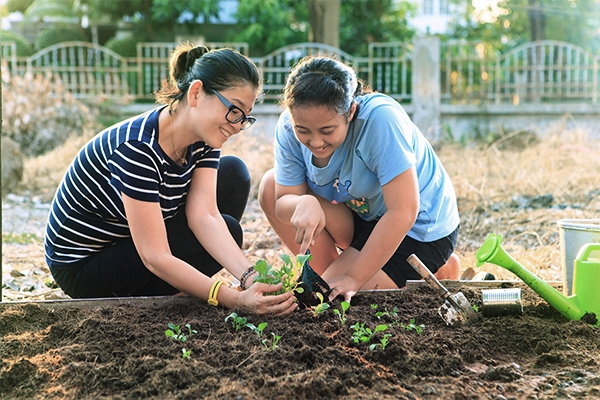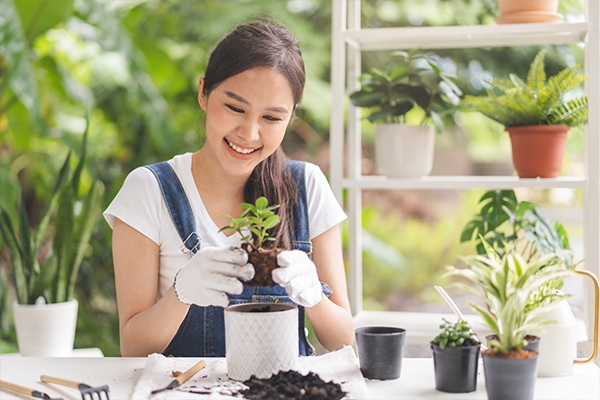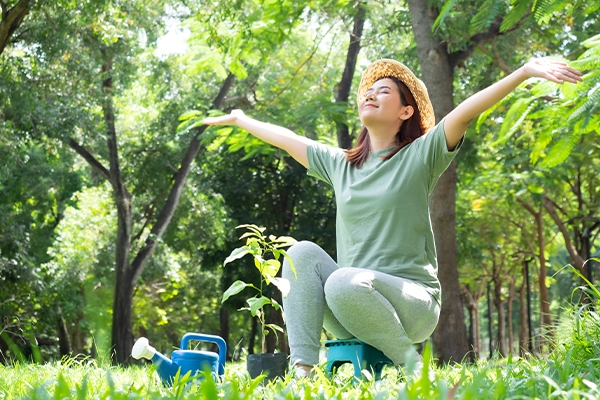7 Gardening Activities and Mental Health

Gardening entails more than just planting and caring for plants. Gardening has mental health benefits ranging from stress reduction to immune system enhancement.
Humans and nature are inextricably linked. Nature was provided by the Creator as a source of food. Humans are responsible for transforming nature into a food source.
Gardening is one of the methods used to meet human needs. Even today, gardens provide one of the primary sources of human food.
Gardening is no longer just for food. It can be used to channel creative hobbies, physical activity, or socializing. As a result, humans gain other advantages, such as improved mental health and happiness.
Interestingly, these advantages have been known for centuries. In ancient Egypt, nobles who felt anxious were invited to walk in the garden. From there, gardening was tested as a clinical therapy. Connecting nature, humans, and mental health.
Gardening has 7 mental health benefits

A study published in the "British Journal of Sports Medicine" found that gardening is more beneficial to health than going to the gym.
Gardening for 10 minutes per week lowers the risk of heart disease.
So, how exactly does gardening improve happiness and well-being? Here's how it works:
1. Improves mood and reduces stress
Working in the garden raises serotonin levels in the brain. This boosts your happiness. Gardening helps with mental fatigue recovery, slows the heart rate, lowers high blood pressure, and reduces anxiety.
Gardening provides a break from modern-day activities such as working in front of a computer, watching television, and browsing social media on a phone. All of these activities have the potential to cause stress.
"Looking at green plants helps people recover from stress," said the New York Times. Gardening makes you feel more content, peaceful, and capable of easily concentrating on direct and detailed tasks.
Gardening not only relieves stress but also makes you feel better. For many people, simply being around plants can alleviate stress.
2. Strengthening the bond with nature
Plants alleviate symptoms of depression and anxiety, as well as other health conditions such as cardiovascular disease, asthma, and weakened immune function.
Gardening allows you to take time to appreciate nature and cultivate awareness. Digging, pruning, and weeding require us to concentrate on the task at hand.
3. Enhancing self-esteem
Self-esteem is how much you value and believe in yourself. When you see your plants grow and bloom, you will be pleased. Proud of having taken care of them.
It is a great accomplishment to aid in the growth of plants. Your sense of accomplishment will grow as you see your efforts rewarded with healthy plants.
4. Increasing attention span
Gardening assesses your ability to devote your full attention to one activity. Gardening can help you learn to concentrate or focus on what is in front of you if you have trouble focusing on tasks, conversations, or topics in everyday life.
Outdoor activities have been shown in studies to reduce the symptoms of ADHD (attention deficit hyperactivity disorder), a mental disorder marked by difficulty concentrating.
5. Assisting in maintaining fitness
Gardening requires physical activity such as weeding, digging, sweeping, or pulling weeds. These activities keep you fit. Regular exercise reduces anxiety, depression, and other mental health issues, as well as preventing dementia.
If you dislike going to the gym, gardening can be a fun way to stay fit. You not only stay fit but also burn calories.
Digging and harrowing burn 250 calories. Mowing the lawn burns 150 calories. Weeding burns 105 calories. Leveling the ground burns 100 calories. Isn't it entertaining?
6. Fostering social bonds
You can use your garden as a gathering place for your closest friends and family. Enjoying tea, chatting, or simply taking in the garden atmosphere.
You can also enjoy the greenery of the leaves, the fragrance of blooming flowers, the sound of birds chirping or running water, and the sting of the sun. You not only become more connected to nature, but you also feel a familiar bond with your loved ones.
Gardening in a group fosters collaboration. Watering, fertilizing, and harvesting the garden can be done alternately or as a group.
7. Boosting the immune system
When you garden outside, you will get free vitamin D from the sun. In the long run, adequate vitamin D intake increases resistance to chronic diseases. Another thing you may not be aware of is the Mycobacterium vaccae bacteria that may adhere to your nails while gardening.
This bacteria appears to be beneficial in alleviating symptoms of asthma, allergies, and psoriasis, as well as relieving depression. So don't hesitate to get your hands dirty with plants and soil.
Gardening, in addition to being beneficial to mental health, improves air quality. Pollutants such as carbon dioxide, nitrogen dioxide, fine particles, and organic compounds can be removed by plants.
Carbon dioxide buildup impairs cognitive performance. Meanwhile, pollution causes long-term health problems ranging from eye irritation to throat problems to cancer.
**

What are you waiting for? Gardening is the best medicine when you're tired and stressed. Do you need to work out? Get a shovel and water the plants.
Looking for fresh food? Pick some fruits and vegetables from your garden and share them with your neighbors. Let's go gardening. Love yourself! Love the earth!
If you're experiencing mental health problems, click on WhatsApp or visit the nearest GWS Medika Clinic.



